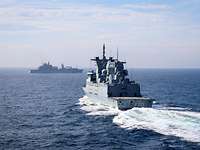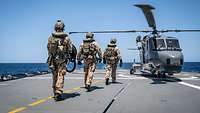Bundeswehr supports peace and security in the Indo-Pacific
The Indo-Pacific is the region with the fastest growth and the most dynamic economy in the world. At the same time, geostrategic lines of conflict in the region require the special attention of Germany and its allies. Germany is addressing these challenges and showing presence in the region – also with Bundeswehr forces.

The economic data clearly shows that the Indo-Pacific region is an economic hotspot. The Pacific Rim countries include three of the strongest economic powers in the world – the United States, China and Japan. Important BRICSBrazil, Russia, India, China and South Africa countries such as India and Russia also border the Pacific Ocean.
Today, almost 60 percent of the global economic output is generated in the Indo-Pacific region. The same applies to approximately two-thirds of global economic growth. And since around 90 percent of the world’s trade is carried out by sea, the Indo-Pacific region also has outstanding importance as a trade route. About one-quarter of global maritime trade passes through the Strait of Malacca.
But the Indo-Pacific is also a region of massive geopolitical conflict. The People’s Republic of China, in particular, has for many years been trying to expand its position of power in the Pacific region at the expense of various neighbouring states. By building artificial islands, for instance in the South China Sea, China has established military bases outside its national territory, thus provoking conflicts over sea routes, natural resources and fishing rights. This poses a threat to peace in the region and to the security of international shipping and trade routes.
Additionally, many of the densely populated and dynamically growing states in the Indo-Pacific region have been embroiled in border conflicts with each other for years. Tensions between China and India have repeatedly led to military clashes. There is also a permanent threat of escalation between Pakistan and India. The fact that these countries, and now probably also North Korea, possess nuclear weapons makes the situation even more volatile, with significant growth opportunities and dynamic social development on the one hand, and the latent threat of war on the other.
For Germany as one of the world’s largest exporting nations, the region is of immense importance. “The Indo-Pacific is one of the central regions in terms of security and prosperity in the 21st century,” Federal Minister of Defence Boris Pistorius said at the 2023 Shangri-La Dialogue in Singapore. “We cannot afford to neglect this region.”
With these words, the Minister drew attention to the security guidelines for the Indo-Pacific region adopted in September 2020. Germany considers peace and security as top priorities in this respect. And freedom of navigation plays an integral role in this topic area. As a logical consequence, Germany is willing to increase its security engagement in the region. To this end, existing defence contacts are to be intensified and cooperation with partner nations is to be expanded. In line with this policy, Germany in future wants to increasingly take part in military exercises together with its partners.
The announcements have since been translated into action. From August 2021 to February 2022, the frigate Bayern sailed a total of 43,000 nautical miles through this maritime region on behalf of the German Navy, visiting numerous partner nations on the way. During Operation Rapid Pacific in August 2022, the German Air Force demonstrated its ability to deploy combat aircraft to the Indo-Pacific within 24 hours. In the subsequent Pitch Black air combat exercise, German pilots trained side by side with fellow soldiers from Australia, India, the USUnited States and about a dozen other states. And during the Talisman Sabre 23 exercise in Australia in 2023, the German Army also consolidated its interoperability with NATONorth Atlantic Treaty Organization Allies and partner nations from the Indo-Pacific region.
The major security and geopolitical challenges in the Indo-Pacific region persist. In 2024, the Bundeswehr will continue to conduct exercises in the region together with its partner nations. At the end of February, the German frigate Hessen set sail toward the Red Sea where, since the outbreak of the Gaza war, the Yemen-based Houthi militia has attacked merchant ships traveling between Europe and the Indo-Pacific region. The European Union is therefore considering a military operation in the region to protect international merchant shipping.



